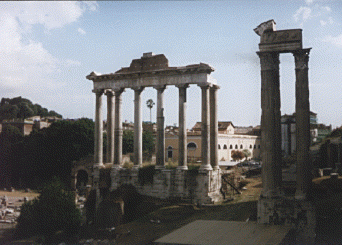
|
Classics 24 |
|
Roman History and Civilization |
|
Fall 2002 |
|
|
| |||
|
|
|
|
INSTRUCTOR: |
Robert W. Cape, Jr., Associate Professor of Classics | |||
|
OFFICE: |
AD 310 |
PHONE: x2241 |
MAIL: 61653 |
EMAIL: rcape@austincollege.edu |
|
OFFICE HOURS: |
11:00-12:00 MWF, & by appointment or just dropping by. | |||
This course examines Roman civilization from its prehistoric beginnings to the first two centuries of its Empire. Our readings will come primarily from Roman historians, biographers, and the everyday Roman craftsmen and artisans who left inscriptions and artwork that we can still view. We will supplement these texts with archaeological material, lierary writings, and some modern scholarship. Our primary goal is to understand better the Romans as a foreign and historic people. A secondary goal is to trace the influence of Rome upon the literary, artistic, legal, religious, political, and social aspects of our culture.
The class will meet three a week and the format will be a mixture of lecture and discussion. The reading assignments should be completed before the class in which they are to be discussed. Participation is an important part of the overall grade and is based on comments to and about the readings done prior to class. Both the readings and the lectures will be full of crucial names, dates, places and terms which you must remember. All such terms introduced in lecture will be written out for your convenience. Yet, despite the wealth of factual material, the focus of the course will be on making sense of this material through synthesis, analysis, and interpretation. Therefore, interpretative and communicative essays will form a major part of the grade in addition to more objective examinations.
There will be two examinations: a midterm on Friday, October 18, and a final on Wednesday, December 11, from 9:00-11:00am. Make-up examinations are not given except under the most extreme conditions, about which I must be notified in advance if possible. There are two papers, the first due October 9, and the second due at the final exam. These papers, 4-5 pages in length, are designed to help develop skills in analyzing sources and communicating information to others. There will be one movie shown outside the regular class time (exact time and place to be announced; alternative times/places will be offered). In addition, due to my travel schedule this semester, I may have to reschedule a class or two for another time and day, but arrangements will be made in advance.
Attendance at class meetings is mandatory. Each unexcused absence in excess of three (3) will lower your attendance/participation score by one-half letter grade (e.g. from A- to B on fourth absence, from B to C+ on the fifth). I shall drop the student from the class after the seventh unexcused absence. The College's Standards of Academic Integrity are assumed to apply to your work for this course.
The grading structure is as follows:
|
Class attendance, preparation, participation |
20% |
|
Midterm |
20% |
|
Papers (two papers @ 10% each; approx. 4-5 pp.) |
20% |
|
Three Short Projects/Reports--to be assigned (@ 5% each) |
15% |
|
Coin Project |
5% |
|
Final examination |
20% |
As you can see, participation is a significant percentage of your grade, more significant than you may have expected. One participates in several ways in such a course, and the participation indicated here is active participation, not merely attending class. This participation is a natural product of solid preparation, commitment to the class, and an eagerness to learn about the material. Participation is expressed by taking part in discussions, asking pertinent questions, being attentive in class, and showing initiative in following up discussion topics.
For students who are taking this course as CLAS 54, you will be required to do extra reading, a term paper and one report summarizing scholarship on one aspect of Roman life. The topic of the term paper will be determined later in the semester, but it will address issues above and beyond those covered in class. It will also require further readings and a moderate knowledge of appropriate bibliographic resources, for which I shall provide assistance.
The following is a tentative schedule of class presentations and reading/preparation assignments. There may be some adjustment during the course of the semester if we need more or less time to discuss certain topics, or if we desire to investigate a subject not currently on the list. All adjustments and the reading currently marked "to be assigned" will be announced in advance in class.
Atlas = Penguin Historical Atlas of Ancient Rome, by
Chris Scarre
ARD = As the Romans Did, by Jo-Ann Shelton (second
edition)
AR = Ancient Rome: The Archaeology of the Eternal City,
ed. by J. Coulston and H. Dodge (Oxford, 2000). ON RESERVE
|
|
| ||||||||||||
|
|
| ||||||||||||
|
|
| ||||||||||||
|
|
| ||||||||||||
|
|
| ||||||||||||
|
|
| ||||||||||||
|
|
| ||||||||||||
|
|
| ||||||||||||
|
|
| ||||||||||||
|
|
| ||||||||||||
|
|
| ||||||||||||
|
|
| ||||||||||||
|
|
| ||||||||||||
|
|
| ||||||||||||
|
15 |
|
Robert W. Cape, Jr., Associate Professor of Classics Classical & Modern Languages 900 N. Grand Avenue, Suite 61653 Sherman, TX 75090-4040 phone: (903) 813-2241 fax: (903) 813-2011 |